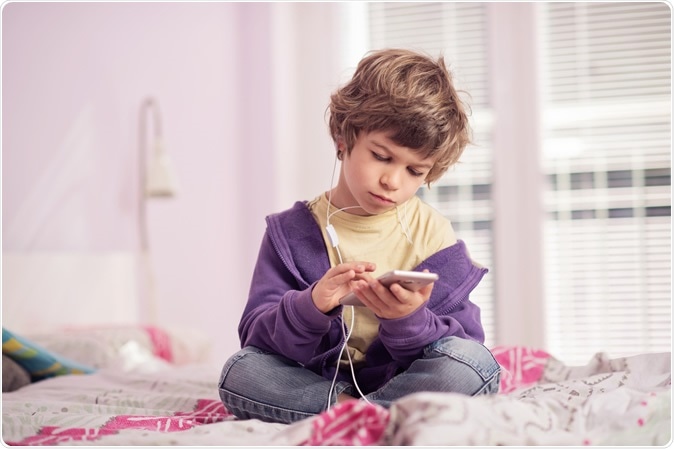In an alarming new finding from the recent Australian Child Health Poll it has been seen that nearly one third of preschoolers and two thirds of primary school aged children are owners of smart phones. If not owners, one in two kids are using these smart phones unsupervised, the poll finds.

Image Credit: KaliAntye / Shutterstock
Results from the report show that 67% of primary school children and 36% of preschoolers owned a smart phone or a tablet. 43% regularly used these screen based devices at bed time the report says. Nearly 75% teenagers and 20% primary school children have their own social media accounts. Kids are spending 32 hours a week on average in front of a screen says the poll.
According to Dr Anthea Rhodes, peadiatrician at the Royal Children’s Hospital Melbourne and director of the national poll, this was a worrying trend that so many children had unsupervised and unlimited access to a smart phone device. She added that there is little or no evidence that usage of these devices such as the smart phone or the tablet could boost the development of a child. However on the flip side there are numerous studies that outline the health risks associated with the excessive usage of these devices by children. She explained that excess use of these devices have been linked to unhealthy weight gain, difficulty in getting adequate sleep, changes in behavior and behavioral problems and also social and emotional well being.
According to the 2014 national screen time guidelines, children less than 2 years of age should not spend any time watching television or any screen based device, electronic media, DVDs or electronic games. Among older children too, the guidelines are strict in terms of limiting screen time to ensure better physical, mental, emotional and overall development.
The poll noted that the children were using the screen based devices at bed time. More than half of the children spent time with the screen before bed time the poll reports. This probably could be linked to sleep difficulties in nearly a quarter of the children studied.
It is worrying that 85% of the parents have agreed that they provide their children with these screen based devices in order to get things done without interruption. Two thirds of the families surveyed reported problems and conflicts arising out of screen time based ideology differences.
Parents with higher levels of screen use are likely to have children with similar usage says Rhodes. Three in four parents of children under the age of six, report that they have no set screen time limits for their children.
The usage of screen based devices, unsurprisingly is highest among teenagers. Teenagers spend around 44 hours with their devices a week. This is over and above a full time job say experts. Screen time for teenagers before bed time is also alarming with huge number of bullying reports arising out of such before bed time usage say researchers. The Institute of Family Studies estimates that around 10 to 20 percent of children and youngsters suffer from harassment online.
There are several harmful consequences of this excessive screen time says Rhodes and much of it is still not clear to us. What is clear is that physical playtime and a face-to face interaction with other children and friends was important in a child’s brain and physical development rather than screen based leisure. She added that each hour the kid spends with a screen based device is an hour lost when they could be physically playing or interacting with others.
Source:
Australian Child Health Poll